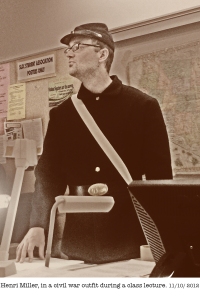 Recently, Lens of War contributing writer Morgan Aldous had an opportunity to interview Henri Miller, an instructor at Salt Lake Community College. Here are some of Miller’s thoughts he shared with us.
Recently, Lens of War contributing writer Morgan Aldous had an opportunity to interview Henri Miller, an instructor at Salt Lake Community College. Here are some of Miller’s thoughts he shared with us.
Q: Professor Miller, thank you so much for answering our questions and helping us to bring accurate information to our readers. We’d like to start by getting to know you a little bit. Where did you grow up? What is your educational and career background?
A: Well, I am from Santa Monica originally but have spent most of my life in Utah. I have a Masters in European History since the Renaissance and teach European & US History & World History once in a while. I have been at SLCC for 4 or 5 years. I teach at SLCC and UVU and taught 8th grade in Seattle for a while prior to teaching at SLCC.
Q: I have been told by one of your former students that you are a bit of an expert on the history of warfare. What is it about studying warfare that interests you?
A: I’m not sure if I can qualify as an “expert” but military history has long been fascinating to me. As to why, war brings out the best and worst in people. It makes for riveting reading. War also reminds that real life, stripped of its superficiality, is struggle and that the bubbles of peace we live in can and have been shattered at random times. There is always a challenge to one’s existence & one’s views. Conflict also challenges a person’s own perception of themselves. I suppose for these reasons military history has been an interest of mine and growing up the stories of adventure, of triumph, of defeat and of sorrow always made me reflect upon the nature of life itself.
Q: When did this interest first develop?
A: My interest in military history and history in general started from a young age when I first picked up books. Probably around age 5 or 6.
Q: How do you feel the rest of us can benefit from understanding the history and causes of war?
A: Like history in general I think a study of military history serves as a basis to understand how people function, why they do what they do and allows for predicting what they will do in the future. Practically speaking military history explains why war happens, how to avoid war if possible and how to prosecute one successfully if necessary. Apart from direct applications, I think both the famous and ordinary individuals who fight in wars can be models of inspiration or infamy that display what humans can do when put to the ultimate test.
Q: As you know, this is a magazine about how film helps us understand the experience of war, and most importantly how this understanding shapes our perception of social justice. What do you feel is the relationship between warfare and social justice?
A: Social justice and war? This is a fascinating concept. Using force to preserve “justice” has often been used as a pretext for conflict. Do you use force to prevent the use of force? Of course avoiding war and preserving peace at any price has often led to only greater & bloodier wars later on. Social justice issues can also extend to the concept of how a war is waged, with or without rules and so on. Often both sides fight fire with fire. Historically, war has been a highly effective method of forcing people to see things your way… whether it be about social justice issues or anything else. The victor usually is able to tell the loser what to do in regards to social justice. War has dramatically changed cultures around the world and continues to shape what we think is acceptable and what is not.
Q: Do you feel that war is accurately portrayed in Hollywood films?
A: Well I’m pretty sure that the samurai were not bullet proof, so when I saw Tom Cruise get hit by thousands of bullets in The Last Samurai I had to laugh. Some movies are not meant to be historically accurate but are designed to give you a sense of the mood and sentiment of the time. They are there to convey the message of the film rather than a precise reflection of events. The movie 300, for example, is based on both a comic book and a real event. While I’m pretty sure that Xerxes didn’t have half human, half goat musicians; it is still a great film about a very real heroic epic.
Q: What about documentaries? Are there any that you particularly recommend?
A: I’ve never been a huge fan of documentaries, but the Military Channel has some fun ones. Also plain old Youtube has some fascinating things on military history, on a greater variety of subjects.
Well, Professor Miller, thank you so much for taking the time to answer our questions. We appreciate your insights. Now, just for fun, what is your favorite Hollywood war film?
I don’t know if I have a favorite war film. There are just too many that I enjoy. I did recently see the Eagle, and enjoyed that a lot. Once an old neighbor lady who lived nearby accused me of living in a war zone since she could always hear explosions coming from my condo.
